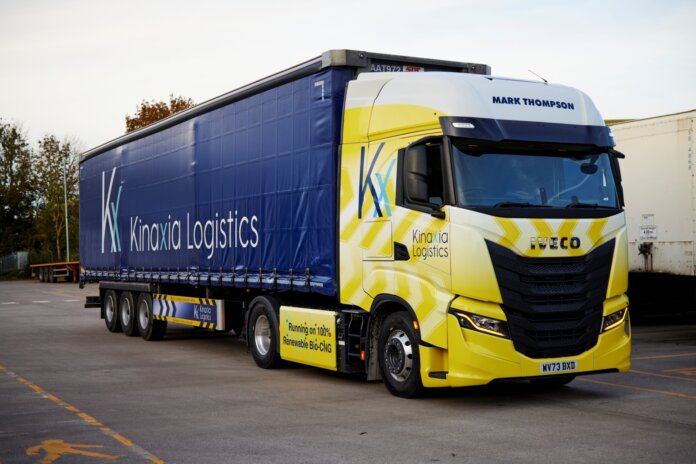Kinaxia Logistics, with operations across the United Kingdom, has taken delivery of its first batch of tractor units powered by compressed natural gas (CNG) as the company moves toward having a net-zero-emissions fleet throughout its national line-haul service.
The company has invested over 2 million pounds in IVECO S-Way trucks for its Primary division, replacing diesel vehicles in the fleet.
According to Richard Smith, managing director of the division, the new vehicles make up 10% of the Primary fleet, with more on order for delivery in 2024.
“These CNG trucks produce 90 percent fewer emissions than diesel ones, leading to a reduction in CO2 of at least 100 tonnes per truck per year,” says Smith. “The addition of these vehicles is a significant step as we look to create a carbon net zero linehaul and trucking fleet for our customers. We trialed the trucks earlier in the year, and the feedback was extremely positive. Drivers reported a good driving experience and a quieter cab. The units have a good specification, and the CNG fueling network is expanding as more sites continue to come online.”
Other recent greener additions to Kinaxia’s fleet include two IVECO CNG units at its haulage operation in Telford, and a 7.5 tonne Tevva electric truck in use for urban deliveries around Greater Manchester.
Kinaxia is also using units powered by hydrotreated vegetable oil (HVO) exclusively on a number of dedicated customer contracts.
The IVECO S-Way tractor units have been supplied by South West Truck & Van, an IVECO franchise dealer and service agent.
“We are delighted to partner with Kinaxia Logistics as it gets going with its plan to decarbonize transport operations in its Primary division,” says Jack Sims, director at South West Truck & Van. “Having extensively trialed the IVECO S-Way CNG, Richard and the Kinaxia team have embraced the technology and can see the benefits biomethane offers from an emissions reduction and total cost of ownership perspective.
“CNG-powered trucks have been around for some time,” adds Sims. “It’s proven technology, but we are now starting to see more companies with heavy truck fleets take note and look to make the switch. Infrastructure is improving, with public access and back-at-base solutions now available, which makes it the most practical alternative fuel option to move goods at 38 or 44 tonnes.”







